Related Research Articles

Kenneth George Hall was an Australian film producer and director, considered one of the most important figures in the history of the Australian film industry. He was the first Australian to win an Academy Award.

Smithy is a 1946 Australian adventure film about pioneering Australian aviator Sir Charles Kingsford Smith directed by Ken G. Hall starring Ron Randell. It was Hall's last feature film as a director.

Cinesound Productions Pty Ltd was an Australian feature film production company. Established in June 1931, Cinesound developed out of a group of companies centred on Greater Union Theatres that covered all facets of the film process, from production to distribution and exhibition. Cinesound Productions established a film studio as a subsidiary of Greater Union Theatres Pty Ltd based on the Hollywood model. The first production was On Our Selection (1932), which was an enormous financial success.

Shirley Ann Richards was an Australian actress and author who achieved notability in a series of 1930s Australian films for Ken G. Hall before moving to the United States, where she continued her career as a film actress, mainly as a Metro-Goldwyn-Mayer starlet. Her best known performances were in It Isn't Done (1937), Dad and Dave Come to Town (1938), An American Romance (1944), and Sorry, Wrong Number (1948). In the 1930s, she was the only Australian actor under a long-term contract to a film studio, Cinesound Productions. She subsequently became a lecturer and poet.
Dad and Dave Come to Town is a 1938 Australian comedy film directed by Ken G. Hall, the third in the 'Dad and Dave' comedy series starring Bert Bailey. It was the feature film debut of Peter Finch and is one of the best known Australian films of the 1930s.
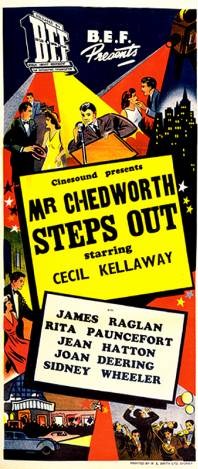
Mr. Chedworth Steps Out is a 1939 Australian comedy film directed by Ken G. Hall starring Cecil Kellaway. Kellaway returned to Australia from Hollywood to make the film, which features an early screen appearance by Peter Finch.
Edmond Seward was a Hollywood screenwriter who had originally attended Northwestern University and worked as a journalist, before doing some writing for Disney.
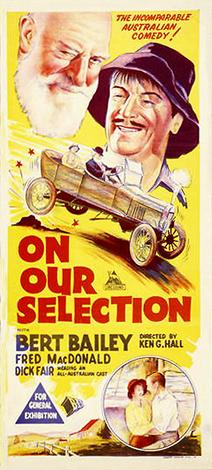
On Our Selection is a 1932 comedy based on the Dad and Dave stories by Steele Rudd. These had been turned into a popular play by Bert Bailey and Edmund Duggan in 1912, which formed the basis for the screenplay. Bailey repeats his stage role as Dad Rudd. He also wrote the script with director Ken G. Hall.
The Squatter's Daughter is a 1933 Australian melodrama directed by Ken G. Hall and starring Jocelyn Howarth. One of the most popular Australian films of the 1930s, it is based on a 1907 play by Bert Bailey and Edmund Duggan which had been previously adapted to the screen in 1910.
The Silence of Dean Maitland is a 1934 Australian film directed by Ken G. Hall, and based on Maxwell Gray's 1886 novel of the same name. It was one of the most popular Australian films of the 1930s.

Strike Me Lucky is a 1934 Australian comedy musical film starring popular stage comic vaudevillian Roy Rene in his first and only film. It was the fourth feature film from Cinesound Productions but proved a box office disappointment. Director Ken G. Hall claimed it was the only one of his features not to go into profit within a few years of release, although the film eventually covered costs.

Thoroughbred is a 1936 Australian race-horse drama film directed by Ken G. Hall, partly based on the life and career of Phar Lap. Hollywood star Helen Twelvetrees was imported to Australia to appear in the film. The film also stars Frank Leighton and John Longden.
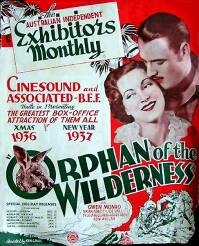
Orphan of the Wilderness is a 1936 Australian feature film from director Ken G. Hall about the adventures of a boxing kangaroo. It starred Brian Abbot who disappeared at sea not long after filming completed.
It Isn't Done is a 1937 Australian comedy film about a grazier who inherits a barony in England.
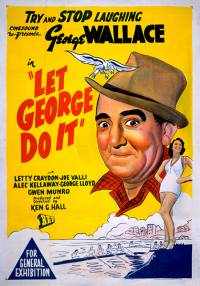
Let George Do It is a 1938 comedy starring popular stage comedian George Wallace. It was the first of two films Wallace made for Ken G. Hall at Cinesound Productions, the other one being Gone to the Dogs (1939). Hall later called Wallace "in my opinion, easily the best comedian that this country has produced."
Gone to the Dogs is a 1939 musical comedy vehicle starring George Wallace. It was the second of two films he made for director Ken G. Hall, the first being Let George Do It (1938).
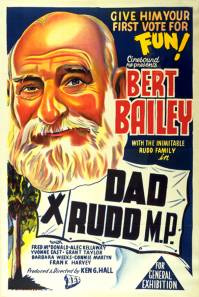
Dad Rudd, M.P. is a 1940 comedy that was the last of four films made by Ken G. Hall starring Bert Bailey as Dad Rudd. It was the last feature film directed by Hall prior to the war and the last made by Cinesound Productions, Bert Bailey and Frank Harvey.
The Exploits of the Emden is a 1928 silent Australian film about the Battle of Cocos; the World War I naval battle between Australian cruiser HMAS Sydney and German cruiser SMS Emden. It consists of footage from a 1926 German film, Our Emden, with additional sequences shot in Australia by director Ken G. Hall. Only part of the film survives today.
Pagewood Studios was a film studio in Sydney, Australia, that was used to make Australian, British and Hollywood films for 20 years.
Overland Adventure: The Story of the 1954 Redex Reliability Trial is a 1954 documentary directed by Ken G. Hall about the 1954 Redex Reliability Trial.
References
- ↑ Ken G Hall screenography at Australian Screen Online
- ↑ Pike, Andrew Franklin. "The History of an Australian Film Production Company: Cinesound, 1932-70" (PDF). Australian National University. p. 213.
- ↑ "Advertising". The Canberra Times . Vol. 31, no. 9, 102. Australian Capital Territory, Australia. 25 February 1957. p. 9. Retrieved 25 March 2016– via National Library of Australia.
- ↑ "Advertisement". The Sydney Morning Herald. 11 November 1956. p. 35.